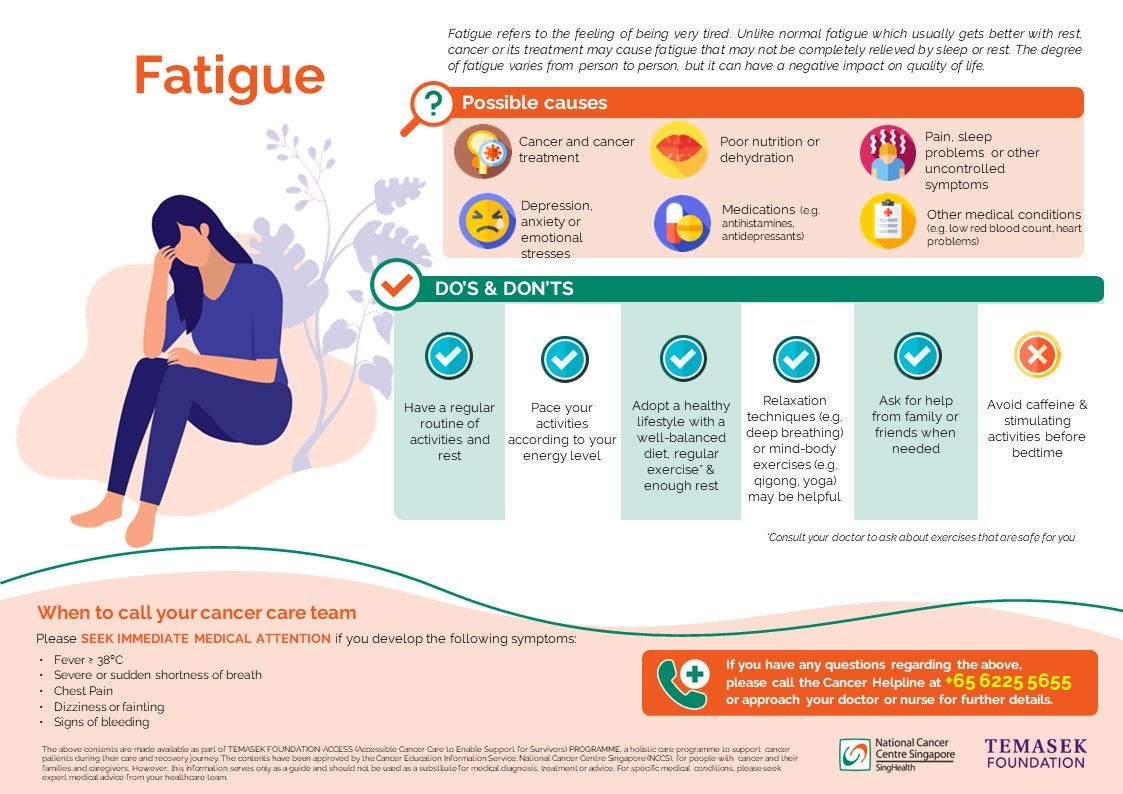National Cancer Centre Singapore will NEVER ask you to transfer money over a call. If in doubt, call the 24/7 ScamShield helpline at 1799, or visit the ScamShield website at www.scamshield.gov.sg.
Feeling Tired (Fatigue)
- Allergies
- Appetite Loss
- Bone Problems
- Breathing Problems
- Constipation
- Diarrhoea
- Difficulty Swallowing (Dysphagia)
- Dry Mouth (Xerostomia)
- Difficulty Sleeping (Insomnia)
- Feeling Tired (Fatigue)
- Fevers and Infections
- Hair Loss
- Heart Problems
- Menopausal Symptoms
- Indigestion
- Joint Pains
- Limb Swelling (Lymphedema)
- Muscle Aches
- Nail Changes
- Nausea and Vomiting
- Pain
- Tingling or Numbness in Hands or Feet (Peripheral Neuropathy)
- Skin Changes
- Sore Mouth (Oral Mucositis)
- Taste Changes

Fatigue refers to the feeling of being very tired. Many factors may contribute to fatigue, including the cancer itself or the treatments used for cancer. Unlike normal fatigue which usually does not last long and gets better with rest, cancer-related fatigue may not be completely relieved by sleep or rest. The degree of fatigue varies from person to person, but it can have a negative impact on quality of life.
Causes of Fatigue
- Cancer
- Treatment side effect (Surgery, chemotherapy, radiation therapy, immunotherapy)
- Depression, anxiety and stress
- Pain or other uncontrolled symptoms
- Certain medications (e.g. antihistamines, antidepressants, opioids)
- Co-existing medical conditions (e.g. heart/lung/kidney problems, hormone problems)
- Insufficient sleep
- Poor nutrition or dehydration
- Low red blood cell count (anaemia)
What you need to look out for
- Feeling weak or tired
- Difficulty concentrating
- Loss of appetite
- Feeling moody or down
- Headaches, dizziness, or problems with vision (e.g. blurriness)
- Increased irritability, impatience or anxiety
How it can be treated
The treatment of fatigue depends on its cause. For instance, fatigue caused by cancer pain will improve with pain control medications. Your doctor or nurse will ask you some questions about your fatigue, including when it started and whether it affects your daily life. Further tests may also be done to look for causes of fatigue that can be treated. Your doctor or nurse may also refer you to the rehabilitation physician, who can recommend a fatigue rehabilitation or exercise program that may help improve your fatigue.
What you can do
Although cancer related fatigue may persist, simple lifestyle changes may be useful in relieving or helping you cope with it. Some practical tips are as follows:
|
|
When to call your cancer care team
Please inform your doctor or nurse if you are breathless, unwell or are unable to do your daily activities because of your fatigue.
If you have any questions regarding the above, please call the Cancer Helpline at +65 6225 5655 or approach your doctor or nurse for further details.
Click here to download the PDF version of this article.
如果您要下载本文的中文版本,请点击此处。
Klik di sini untuk memuat turun versi PDF artikel ini.
The above contents are made available as part of TEMASEK FOUNDATION-ACCESS (Accessible Cancer Care to Enable Support for Survivors) PROGRAMME, a holistic care programme to support cancer patients during their care and recovery journey.
The contents have been approved by the Cancer Education Information Service, National Cancer Centre Singapore (NCCS), for people with cancer and their families and caregivers. However, this information serves only as a guide and should not be used as a substitute for medical diagnosis, treatment or advice. For specific medical conditions, please seek expert medical advice from your healthcare team.
Brought to you by:
![]()
![]()
Keep Healthy With
© 2025 SingHealth Group. All Rights Reserved.

















